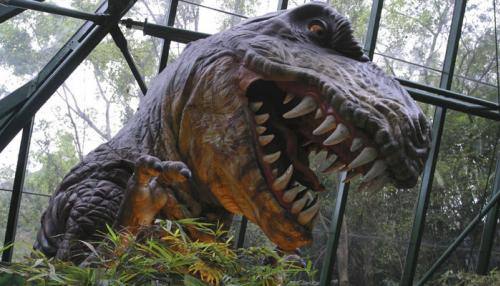- News>
- Environment
Dinosaurs took months to hatch from eggs - Did long incubation time play a role in their extinction?

Scientists find Dinosaurs eggs hatched slowly like reptiles, not birds.
Dinosaurs - They existed some 65 millions of years ago, but all we have left of them are bones and uncountable theories around them.
Some dinosaur eggs took as long as three to six months to hatch — strangely, a notable long time that may have become a drawback for dinos at the time of their extinction.
Researchers till long believed that the duration of dinosaur incubation was similar to that of birds, whose eggs hatch within 11 to 85 days.
In the study, published on Monday in "Proceedings of the National Academy of Sciences", researchers say that dinos possessed more traits of reptiles whose eggs take weeks to months to hatch.
Lead author Gregory Erickson, Professor at Florida State University, says, "Some of the greatest riddles about dinosaurs pertain to their
embryology -- virtually nothing is known. Did their eggs incubate slowly like their reptilian cousins? Or rapidly like living dinosaurs -- the birds."
Because the eggs of dinosaurs were so large—some were about 4 kilograms or the size of a volleyball—scientists believed they must have experienced rapid incubation with birds inheriting that characteristic from their dinosaur ancestors.
Erickson, FSU graduate student David Kay and colleagues from the University of Calgary and the American Museum of Natural History decided to put these theories to the test.
To do that, they accessed some rare fossils—those of dinosaur embryos.
The two types of dinosaur embryos researchers examined were those from Protoceratops — a sheep-sized dinosaur found in the Mongolian
Gobi Desert whose eggs were quite small (194 grams) — and Hypacrosaurus, an enormous duck-billed dinosaur found in Alberta, Canada with eggs weighing more than 4 kilograms.
The growth markers in the embryos’ teeth showed that the Protoceratops eggs took almost three months to hatch, while the Hypacrosaurus eggs took almost six months. Because some dinosaurs were bigger than the Hypacrosaurus, incubation time could have been even longer for some dinos.
The study found out that if dino parents had to spend half a year or more tending their eggs, they couldn’t have migrated easily and thus had to stay in one place for a long time, putting them and their eggs at risk of being eaten by other predators.
The eggs would also have been at high risk from floods and droughts for long periods of time.
Scientists now claim that there are possibilities that when an asteroid hit the earth 65 million years ago, kicking off a time of rapid climate
change and mass extinction, dinosaurs weren’t reproducing as fast as other animals.
And the long incubation time might have contributed to their extinction.
